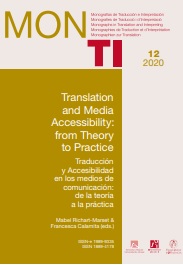El gran reto de la traducción y la accesibilidad audiovisual en los medios de comunicación
##plugins.themes.bootstrap3.article.main##
Resum
Este artículo editorial ha sido escrito, en la medida de nuestras posibilidades, siguiendo las recomendaciones para expresarnos en Lenguaje Claro. Estas pautas se encuentran en la guía breve, Lenguaje Claro. Comprender y hacernos entender, elaborada por el Instituto de Lectura fácil. Aquí copiamos el enlace para su consulta: https://repositorio.comillas.edu/jspui/retrieve/73454/GUIA%20DEF%20LENGUAJE%20CLARO.PDF.
Descàrregues
##plugins.themes.bootstrap3.article.details##
La propietat intel·lectual dels articles pertany als autors i els drets d'edició i publicació, a la revista. Els articles publicats en la revista podran ser utilitzats lliurement per a propòsits educatius i científics, sempre que se'n faça una correcta citació. Qualsevol ús comercial és expressament penat per la llei.
Referències
Arnaiz Uzquiza, Verónica. (2012) “Los parámetros que identifican el subtitulado para sordos. Análisis y clasificación.” MonTI 4, pp. 103-132.
CESyA. (2014) Memoria del Centro Español del Subtitulado y la Audiodescripción (CESyA) 2005-2013. Madrid: Real Patronato sobre Discapacidad.
Cuellar Lazaro, Carmen. (2016a) “El subtitulado para sordos en España y Alemania estudio comparado de los marcos normativos y la formación universitaria.” Revista Española de Discapacidad (REDIS), 4:2, pp. 143-162.
Chica Núñez, Antonio J. y Silvia Martínez Martínez. (2016) “Adecuación cognitiva de contenidos y recursos accesibles para ciegos en la APP “QR-UGR”: Proyecto DESAM.” In: Cristina Álvarez de Morales Mercado & Catalina Jiménez Hurtado (eds.) 2016. Patrimonio cultural para todos: Investigación aplicada en traducción accesible. Granada: Tragacanto, pp. 125-142.
Chimiel, Agnieszka & Iwona Mazur. (2012) “AD Reception Research: Some Methodological Considerations.” In: Perego, Elisa (ed.) 2012. Emerging Topics in Translation: Audio Description. Trieste: EUT, pp. 57-74.
Díaz Cintas, Jorge. (2007) “Por una preparación de calidad en accesibilidad audiovisual.” Trans II, pp. 45-49.
Díaz Cintas, Jorge; Pilar Orero & Aline Remael (eds.) (2007) Media for All. Subtitling for the Deaf, Audio Description and Sign Language. Amsterdam & New York: Approaches to Translation Studies.
Di Giovanni, Elena. (2018) “Audio Description for Live Performances and Audience Participation. Jostrans: the Journal of Specialised Translation 29, pp. 189-211.
Franco Aixelá, Javier. (2009) “MonTI, una apuesta por el rigor y el pluralismo.” In: África Vidal y Javier Franco (eds.) 2009. MonTI A (Self-)Critica


